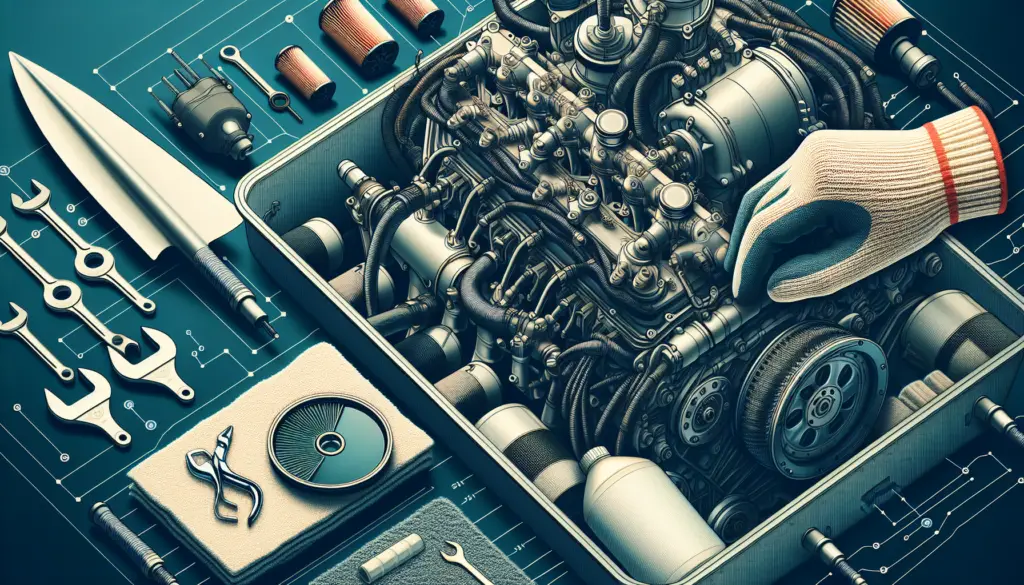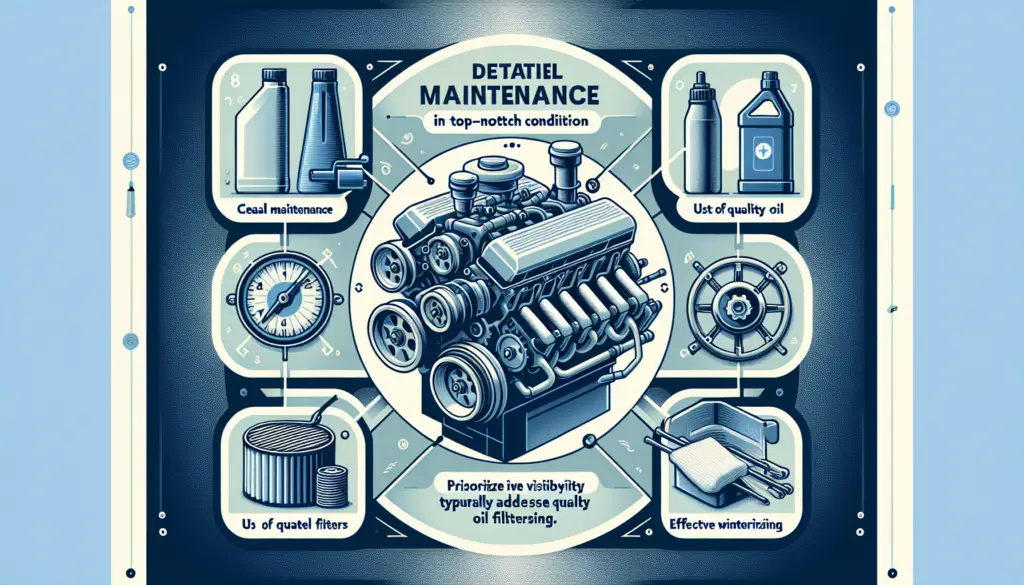Are you looking to get the most mileage from your boat’s engine? This article is for you. It’s packed with top-notch advice aimed at prolonging the life of your boat engine. Ensuring it runs smoothly and efficiently for years to come, your attention to regular engine maintenance can prevent untimely breakdowns and costly repairs. So grab your mechanic’s toolbox and prepare yourself to learn about the best ways to safeguard your investment.

Understand Your Boat Engine
Knowing how to maintain your boat engine starts with understanding it. The best way to lengthen its life is to comprehend how it works, what could go wrong, and how to spot when things are heading south.
Knowing the Basic Components
Just like you can’t troubleshoot your computer without knowing what a motherboard is, you can’t properly maintain a boat engine without understanding its basic parts. To start, your boat engine includes major components such as the cylinder, pistons, intake and exhaust valves, camshaft, crankshaft, timing gear, fuel injectors, and more. Learning these components’ functions will give you a better understanding of the process involved in your boat’s propulsion.
Studying the User Manual
Your user manual is going to be your best friend in this journey. It’s custom-tailored to your boat’s engine, providing guidelines on standard maintenance responsibilities as well as troubleshooting help if you ever run into problems. Don’t leave it gathering dust somewhere. Ensure you read it thoroughly, understand what’s written, and refer back to it as often as needed.
Recognizing Common Engine Problems
Part of understanding your boat engine is recognizing when there’s a problem. Common engine problems can range from overheating, leaky gaskets, fuel inefficiency, to the alarming engine knock. You should familiarize yourself with these problems, so you’re not caught off-guard when they happen.
Perform Regular Maintenance
“An ounce of prevention is worth a pound of cure”. This saying applies perfectly to boat engine maintenance. By performing regular check-ups, you are less likely to experience significant engine issues down the line.
Establishing a Routine Checklist
A routine maintenance checklist ensures that nothing slips through the cracks. It should include checking the oil level, inspecting the fuel system, cleaning filters, assessing the coolant level, scanning for leaks, and checking the battery health. This checklist will act as your roadmap, guiding you through important maintenance tasks.
Inspecting the Engine Regularly
Just like a regular health check-up, your boat engine needs regular inspection. Check for visible issues, like leaking fuel, antifreeze or oil. Monitor the engine’s temperature, vibration, and general performance. Regular engine inspections can help catch potential issues before they become significant problems.
Cleaning and Replacing Filters
Filters play a critical role in your engine’s health by ensuring only clean fuel and air enter your engine. Dirty or clogged filters can lead to inefficiencies or even engine damage. Depending on your use, you should clean or replace your filters regularly.
Examining The Cooling System
An overheated engine is a significant cause of marine engine breakdowns. Therefore, regular inspection of the cooling system is vital. Check the coolant level frequently and keep an eye out for potential leaks.
Applying Anti-Corrosion Techniques
Your boat’s engine is constantly exposed to water, which means it’s at risk of corrosion. To avoid this, it’s vital to regularly clean and apply anti-corrosive treatments and consider using a freshwater flushing system after each use.
Change Engine Oil Frequently
Just like in cars, engine oil in boats should be changed regularly. Fresh oil lubricates, cleans, cools and protects the engine’s components, thereby increasing its longevity.
Choosing the Right Oil
Not all oil is suitable for marine engines. Hence, it’s essential to use the right type of oil recommended by your manufacturer as detailed in your user manual.
Understanding the Importance of Oil Changes
Oil changes are essential for smooth and efficient engine performance. Old oil can lead to sludge buildup which may cause your engine to underperform or even fail. Therefore, consider changing your boat engine oil after every 100 hours of operation or at least once a year.
Recognizing Signs of Engine Oil Problems
There are hard-to-ignore signs that your engine oil needs a change. These include dark and dirty oil, loud engine noise, oil smell inside the boat, and excess exhaust smoke. If these signs appear, promptly change the oil to avoid pressing issues in your engine.

Take Care of Your Fuel System
The fuel system is like the heart of your engine. It pumps ‘life’ into all other components. Hence, taking adequate care of it can extend your boat engine’s life significantly.
Understanding the Importance of the Fuel System
A healthy fuel system ensures that your boat’s engine gets the right fuel-air mixture for optimal performance. By keeping your fuel system clean and well-maintained, you can avoid a slew of engine problems.
Cleaning the Fuel Injectors
The fuel injectors play an essential role in your boat engine’s performance. They deliver fuel under high pressure through a spray nozzle. However, dirt and fuel deposits can clog these injectors, leading to decreased performance. Therefore, cleaning the injectors is of utmost importance.
Using Fresh and Quality Fuel
Stale or contaminated fuel is a leading cause of many boat engine problems. Therefore, always use fresh and high-quality fuel from a trusted source. Consider adding a fuel stabilizer if you store your boat for extended periods.
Installing Fuel Water Separators
Water in your fuel can cause severe damage to your engine. Installing a fuel water separator can help remove any water in your fuel, preventing any harmful effects on your engine.
Check and Replace Belts
Belts in your boat engine play various vital roles, including driving the alternator, water pump, and other components. regular check-ups and timely replacement can avoid a break down at sea.
Identifying the Function of Belts in a Boat Engine
Belts in a boat engine are similar to those in a car; they drive various components such as the alternator and the water pump. A broken belt can lead to nasty surprises, including an overheated engine or a dead battery.
Inspecting Belts for Wear and Tear
Regular inspection can help identify worn-out belts before they break. Keep an eye out for signs of wear and tear, such as cracks, fraying, or glazing.
Understanding When to Replace Belts
Understanding when to replace belts is a crucial part of boat engine maintenance. Generally, belts should be replaced every 100 hours of operation or at the first sign of wear.
Maintain Your Batteries
Batteries play a pivotal role in the health of your boat engine. Keep them charged, clean, and when needed, replace them timely.
Understanding the Role of Batteries in Engine Life
The battery starts your engine and powers electrical components on your boat. Therefore, a dead or weak battery can leave you stranded in the middle of the water.
Checking Battery Health Regularly
Regular battery checks involve testing the voltage, checking for corrosion on the terminals, and ensuring the connections are secure. These routine checks can save you from unexpected surprises.
Ensuring Proper Battery Charging
Charging your boat’s battery is a balancing act. Overcharging can damage it, while undercharging can affect your engine’s performance. Use a marine charger to maintain a suitable charging level.
Avoid Engine Overloading
Excessive load can lead to premature engine wear. Understand your boat’s load capacity and watch out for signs of overloading to avoid unnecessary stress on the engine.
Learning the Load Capacity of Your Boat
Every boat has a manufacturer-determined load capacity, usually found in the owner’s manual. Exceeding this limit can strain the engine and potentially reduce its lifespan.
Identifying Signs of Engine Overload
Signs of overload include difficulty getting on plane, decreased fuel efficiency, abnormal engine noises, and excessive engine heat. Consistent overloading can lead to serious engine damage.
Proper Storage of Boat Engine
When you’re not using your boat, how and where you store it can dramatically affect the life of your engine.
Choosing the Right Environment for Storage
Proper boat storage involves choosing a dry, covered area with limited exposure to the elements. This reduces the risks of water damage, UV exposure, and extreme temperature changes.
Learning How to Winterize Your Boat Engine
If you live in a colder climate, winterizing your engine is crucial. It involves flushing the engine, stabilizing the fuel, applying fogging oil, and completing other tasks to prevent freeze damage.
Understanding the Risks of Inadequate Storage
Improper storage can have serious consequences for your boat engine, including corrosion, battery drain, mildew growth, and even engine seizures in extreme conditions.
Address Issues Immediately
Don’t ignore even minor issues. Small problems, when ignored, develop into more significant issues that can dramatically impact the life of your engine.
Not Ignoring Minor Problems
Take note of even minor changes in your boat’s performance. Problems like a slow start, weak acceleration, poor fuel economy, excess smoke or strange noises are signals that your boat engine requires attention.
Getting Professional Help When Necessary
Even with a robust maintenance regimen, there are times when professional assistance may be required. Tricky tasks like timing adjustment, fuel injector calibration, advanced diagnostics, or major repairs should typically get left to the professionals.
Ensuring Regular Engine Servicing
Just like your car, your boat engine also needs regular servicing. Even if there doesn’t appear to be any issues, scheduling routine servicing can help catch potential problems early.
Maintain Proper Ventilation
A well-ventilated engine compartment reduces the risk of explosion, enhances engine performance and extends engine life.
Understanding the Importance of Ventilation
Proper ventilation allows safe and efficient operation of the engine by eliminating harmful exhaust gases, reducing the risk of explosions, and preventing overheating.
Checking Ventilation Systems Regularly
Make sure your engine compartment has an efficient ventilation system. Check fan operation and duct integrity regularly to ensure harmful gases are promptly expelled.
Avoiding Blockage in the Ventilation System
Clear any obstructions from the ventilation ducts or grilles. A swift brush or vacuum should do the trick. Remember, blocked vents can impair engine performance and lead to overheating or worse.
There you have it. With this comprehensive maintenance guide for your boat engine at the helm, you can ensure your engine cruises smoothly through many sunny days at sea. Consistent care and proper maintenance are truly your best gates against major boat engine problems. Here’s to extending the longevity of your boat engine!

